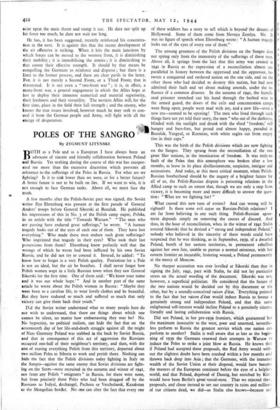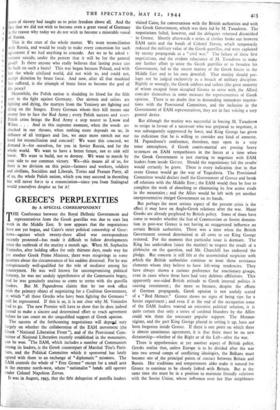POLES OF THE SANGRO
By ZYGMUNT LITYNSKI
reference to the sufferings of the Poles in Russia. For what are we fighting? Is it to sink lower than we were, or for a better future? A better future is not to be built on lies. If we want to win, it is not enough to face German tanks. Above- all, we must face the truth.
A few months after the Polish-Soviet pact was signed, the Soviet writer Ilya Ehrenburg was present at the first parade of General Anders' troops before General Sikorski at Buzuluk. He published his impressions of this in No. 3 of the Polish camp paper, Polska, in an article with the title " Towards Warsaw." " The men who are passing have endured great sufferings," he wrote. " A human tragedy looks out of the eyes of each one of them. They have lost everything." Who made these men endure such great sufferings? Who imprinted that tragedy in their eyes? Who took their last possessions from them? Ehrenburg knew perfectly well that the wrongs of which he wrote had been inflicted by his own Soviet Russia, and he did not try to conceal it. Instead, he added : " To know how to forget is a very Polish quality. Patriotism for a Pole is not an ideal, but the air he breathes. I shall never forget how Polish women wept in a little Russian town when they saw General Sikorski for the first time. One of them said: ' We knew your name and it was our whole hope.'" And in another part of the same article he wrote about the Polish Women in Russia: " Maybe they were born to a carefree life, to wear lovely clothes and be beautiful. But they have endured so much and suffered so much that only vit.tory can give them back their youth."
Did the Soviet writer understand what so many people .here do not wish to understand, that there are things about which one cannot be silent, no matter how embarrassing they may be? No. No hypocrisy, no political realism, can hide the fact that on the seventeenth day of her life-and-death struggle against all the might of Nazi Germany Poland was stabbed in the back by Soviet Russia, and that in consequence of this act of aggression the Russians occupied one-half of their neighbour's territory, and then, with the aim of erasing everything Polish from this territory, deported about two million Poles to Siberia to work and perish there. Nothing can hide the fact that the Polish divisions today fighting in Italy on the Sangro—against the same enemy that Soviet divisions are fight- ing on the Seret—were recruited in the autumn and winter of 5941, not from any Polish " emigrants" in Russia, for there were none, but from precisely these Poles who had been dragged off by the Russians to Ivdyal, Archangel, Pechora or Vercholansk, Kazakstan or the Mongolian border. No one can alter the fact that every one of these soldiers has a story to tell which is beyond' the dreams of Hollywood. Some of them come from Novaya Zethlya. No. It was no figure of speech when Ehrenburg wrote: "A human tragedy looks out of the eyes of every one of them." • The unsung greatness of the Polish divisions on the Sangro does not spring-only from the immensity of the sufferings of these men. Above all, it springs from the fact that this army was created in 1941. in Russia as the expression of a reconciliation almost un- paralleled in history between the oppressed and_ the .oppressor, be- tween a conquered and enslaved nation on the one side, and on the other those who had decided to destroy this nation, but had now admitted their fault and set about making amends, under the in- fluence of a common disaster. In the autumn of 1941, the humili- ated prisoner stretched out his band through the barbed wire to the armed guard, the doors of the cells and concentration camps were, flung open, people went mad with joy, and a new life—even a new era—seemed to be opening! The men who lived through such things have not yet told their story, the men " who out of the darkness, blinded with the sunlight and drunk with the word' `freedom,' still 11 hungry and bare-foot, but proud and almost happy, paraded in
Buzuluk, Yangyul, or Kermine, with white eagles cut from empty tins in their caps."
This was the birth of the Polish divisions which are now fighting on the Sangro. Thty sprang from the reconciliation of the two great Slav nations, in the intoxication of freedom. It was truly no fault of the Poles that this atmosphere was broken after a few months, to leave in its place disillusionment, suspicion, intrigue- and accusations. And today, at this most critical moment, when Polish- Russian brotherhood should be the augury of a brighter future for all of us, the Polish-Russian dispute is poisoning relations in the Allied camp to such an extent that, though we arc only a, step from victory, it is becoming more and more difficult to answer the ques- tion: " What are we fighting for? "
What caused this new turn of events? And can wrong still be righted? Is there some evil curse on Russian-Polish relations? I am far from believing in any such thing. Polish-Russian agree- ment depends simply on removing the causes of discord. And thus, in the hour of reconciliation, when in the winter of 1941 Stalin assured Sikorski that he desired a " strong and independent Poland," nobody who believed in the sincerity of these words could have suspected that he was thinking, as in September, 5939, of a dwarfed Poland, bereft of her eastern territories, in permanent rebellion against her own fate, unable to pursue a normal existence, with her eastern frontier an incurable, festering wound, a Poland permanently at the mercy of Moscow.
No sharper accusation was ever levelled at Sikorski than that in signing the July, 1941, pact with Stalin, he did not lay particular stress on the actual wording of the doctunent. Sikorski was not, however, a superficial politician. He considered that the future of the two nations, would be decided not by this document or the other, but by a soundly-conceived raison d'etat. Everything pointed to the fact that her raison d'etat would induce Russia to favour a genuinely strong and independent Poland, and that this same enlightened self-interest would incline Poland to a genuinely sincere, friendly and lasting collaboration with kussia.
Did not Poland, in her pre-i939 frontiers, which guaranteed her the maximum insecurity to the west, poor and =armed, neverthe- less perform to Russia the greatest service which one nation can perform to another? Stalin is well aware that as late as the begin- ning of 5939 the Germans renewed their attempts in Warsaw to induce the Poles to strike a joint blow at Russia. He knows that if Poland had accepted these proposals, the Red Army would with- out the slightest doubt have been crushed within a few months and thrown back deep into Asia ; that the Germans, with the iinallense wealth of the Soviet Union at their disposal, would have become the masters of the European continent before the eyes of a helpless world, and that Poland, deprived of .Danzig, but enriched by Kiev. would have been Berlin's greatvassal-state. That we rejected then- proposals, and chose instead to see our country in ruins and millions of our citizens dead, we did—as Stalin also knows—because our years of slavery had taught us to prize freedom above all. And the fact that we did not wish to become even a great vassal of Germany is the reason why today we do not wish to become a miserable vassal of Russia.
This is the crux of the whole matter. We want reconciliation with Russia, and would be ready to make every concession for such agreement if we had anything to concede. Are we to be asked t. commit suicide, under the pretext that it will be for the general good? Is there anyone who really believes that lasting peace can be built on such a basis? This war began because Poland, and with her the whole civilised world, did not wish to, and could not, accept dictation by brute force. And now, after all that mankind has suffered, is the triumph of brute force to become the goal of the peace?
Meanwhile, the Polish nation is shedding its blood for the fifth year in the fight against Germany. Our airmen and sailors are fighting and dying, the martyrs from the Yenissey are fighting and dying on the Sangro. Every German whom they kill means one enemy less to face the Red Army ; every Polish success and ever% Polish cross brings the Red Army a step nearer to Lwow and Wilno. . . . And in this supreme moment, when the words are checked in our throats, when nothing more depends on us, in defiance of all intrigues and lies, we once more stretch out our hand for reconciliation and concord! We want this concord, we demand it—for ourselves, for you in Soviet Russia, and for the whole world. We want to have a better future, not to sink still lower. We want to build, not to destroy. We want to march by your side to our common victory. We—this means all of us, for there is no division on this point—farmers and workers, soldiers and civilians, Socialists and Liberals, Tories and Peasant Party, all of us, the whole Polish nation, which you may succeed in throttling but will never force to a renunciation—since you from Stalingrad would yourselves despise us for it!



























 Previous page
Previous page